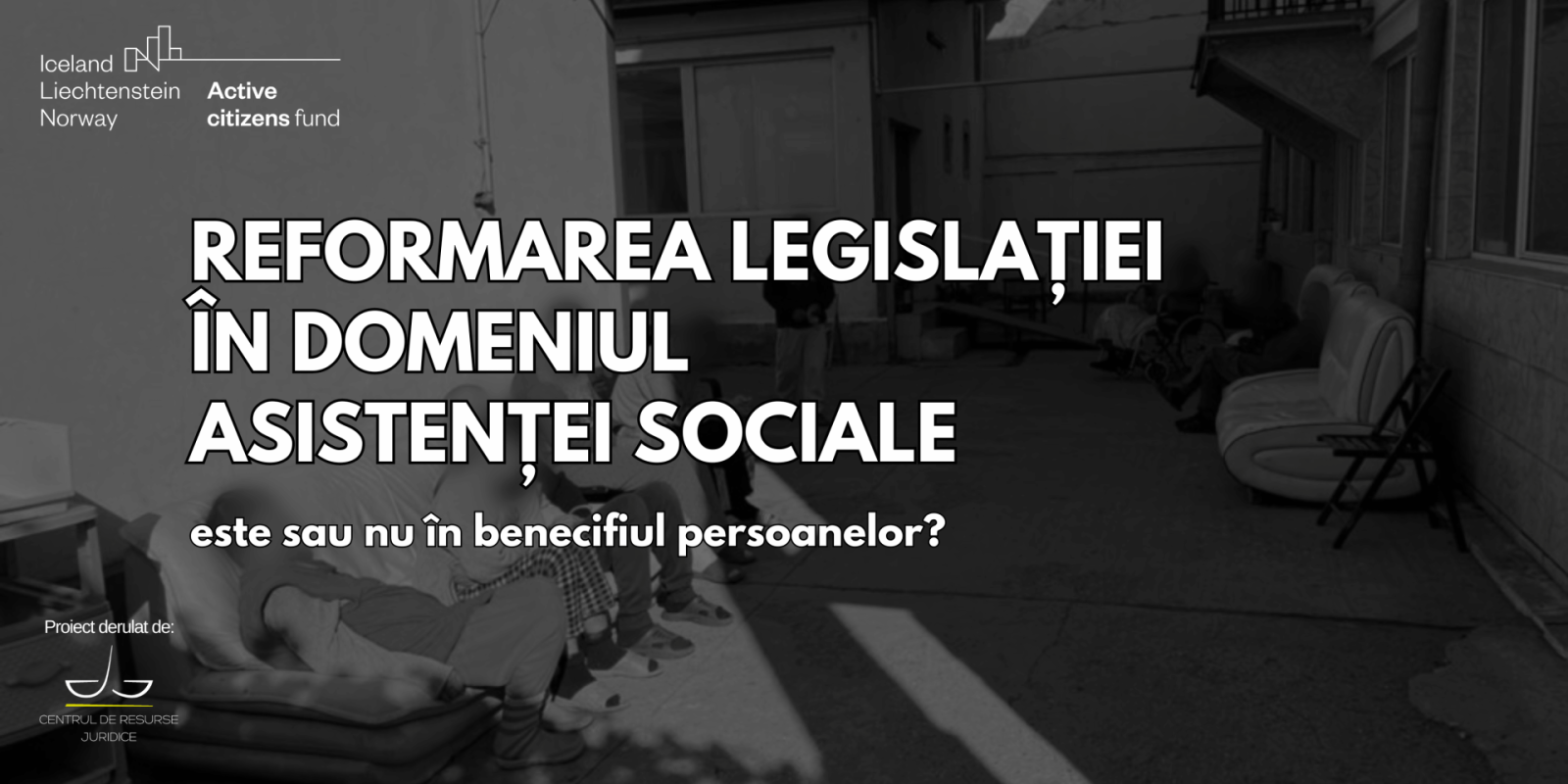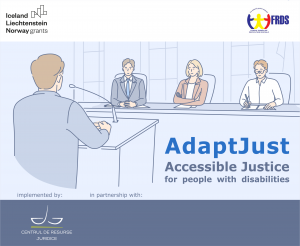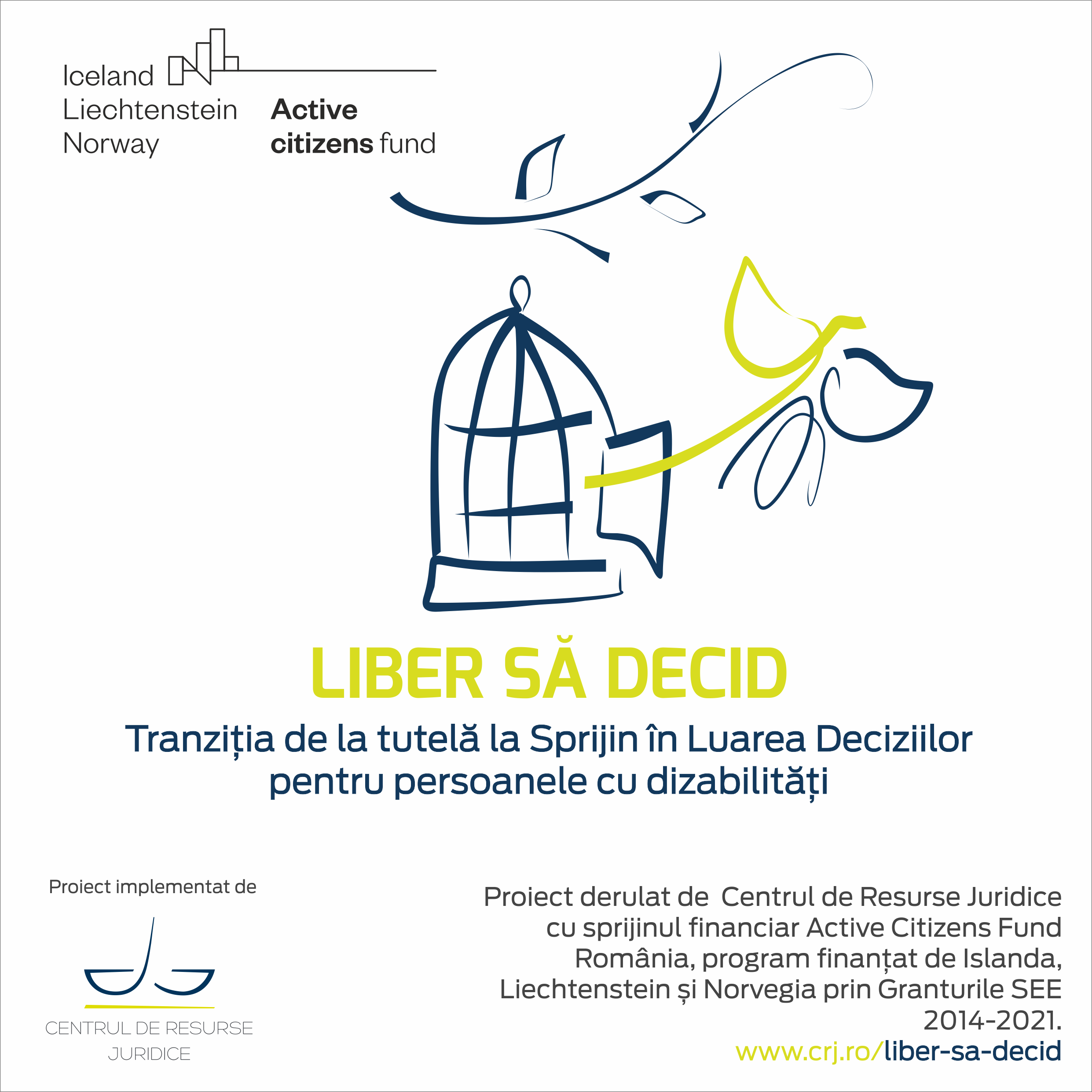“The system needs to be changed […] the whole system needs to be rethought, from authorisation, monitoring and control; who authorises and what are the conditions for authorisation; who monitors; what they monitor – clear intervals and procedures -; who checks and what they check.”[1]
A working group has been set up within the Romanian Government to draft legislative amendments, with experts from the Centre for Legal Resources actively contributing, together with representatives of other non-governmental organisations, by formulating proposals and monitoring the legislative process. However, the draft law for amending and supplementing certain normative acts in the field of social assistance (hereinafter referred to as the Draft Law), submitted for adoption by the Senate on 9 November 2023[2], maintains the prerequisites for the operation of deficient social services, monitored through formal procedures and based on criteria that are difficult to quantify.
In this opinion, we will expose the main shortcomings of the Draft Law, as well as possible solutions that we consider appropriate to improve the quality of life of beneficiaries of social services. At the same time, considering the multitude of social services and categories of beneficiaries, this opinion will focus mainly on the particular situation of adults with disabilities and the social services intended for them.
1. GENERAL ISSUES
The Government’s legislative initiative took the form of a proposal to reform several laws with an impact on social assistance[3].
As a general note, we consider that the omission of the initiators of the Draft Law to harmonize the proposed legislation for amendment with the provisions of Law No. 7/2023 on supporting the process of deinstitutionalization of adults with disabilities and applying measures to accelerate it and prevent institutionalization is criticisable. Thus, the Draft Law does not contain obligations for the relevant authorities and/or social service providers, so that the key performance indicators of public policy on the deinstitutionalisation process[4] are met in a timely manner. In our opinion, it is appropriate to draw up a legislative framework to support the development of independent living skills of the beneficiaries of care and assistance centres – only in this way can adults with disabilities who benefit from social services have an effective chance to live in the community and participate in its life. Otherwise, accommodation in social care homes is nothing more than an indefinite ‘sentence’ to isolated and sometimes degrading living. Obligations to make the transition to community living more effective may include ongoing training for staff working in social care centres or regular assessment of beneficiaries’ independent living skills. We point out that, according to Article 38 of Law No. 7/2023, from 1 January 2031 social service providers accredited under the terms of the law may no longer set up social care centres for adults with disabilities, with the exception of respite centres/crisis centres – precisely for this reason, it is crucial that changes to social assistance legislation take into account the medium- and long-term perspectives of public policies on community integration of adults with disabilities.
In addition, despite the commendable nature of the approach to reforming the legislation applicable to social service providers, it should be stressed that the Draft Law retains the cumbersome procedures of the current regulation regarding licensing and its withdrawal. Moreover, we believe that some of the new procedures for the control/monitoring of social service providers will prove ineffective in practice, due to the way they have been configured by the legislator. In the following, we will analyse the main shortcomings identified in the Draft Law.
· SPECIFIC ISSUES
- BRIEF OVERVIEW OF THE CURRENT LEGISLATIVE FRAMEWORK
For a good understanding of the changes introduced by the Draft Law, and the associated shortcomings, a preliminary description of the current legislative framework applicable to social services for adults with disabilities is necessary.
· Accreditation of social service providers
The current legislation[5] provides for the accreditation procedure for social service providers, which is also retained in the Draft Law. Thus, the applicant for accreditation[6] must demonstrate the fulfilling of certain formal conditions[7], which are accessible to most of the entities established under the law, and must undertake to establish and provide social services within a maximum of 3 years from the date of the accreditation certificate.
In fact, it is possible and highly likely that, at the time of applying for and obtaining accreditation, the social service provider does not have a concrete plan for the development of a social service, has not identified a suitable space for the provision of social services or has not started the process of hiring qualified staff. If, within 3 years of obtaining accreditation, the provider does not comply with the obligation to start providing social services, the only sanction is the withdrawal of the accreditation certificate.
However, the legislator considered it appropriate to grant and maintain the status of accredited social service provider for at least 3 years, based on summary conditions. Moreover, given that the accreditation procedure checks purely formal conditions, accreditation is, in our opinion, a pointless bureaucratic step which could be included in the licensing procedure.
· Provisional licensing of social services
To obtain a provisional licence, the applicant shall submit a standard application for licensing, which shall mainly include data and information on: a) the social service; b) the provider of the social service; c) the beneficiaries of the social service and their situations of difficulty; d) the main activities carried out; e) the building/space in which the social service operates; f) human resources;
- sources of funding; h) the supporting documents required.
The supporting documents consist of the following documents:
- the document attesting the right of use of the space where social services will be provided,
- the legal document establishing the social service,
- the rules of organisation of the social service,
· photographs of the premises where social services are provided,
- the CV of a person qualified in social work or social services management,
- a copy of the employment contract or service contract concluded with the person referred to in the above point,
- a commitment by the provider to notify any changes to the social service for which it has been granted a licence to operate which occur after the licence has been granted, contingency plan in case of withdrawal of the operating licence/termination of the social service, if provided for in the applicable minimum quality standard.
In addition, for provisional licensing, the applicant shall prepare a self-assessment form – a standard form in the nature of an affidavit, in which the representative of the social service provider ticks off how many of the quality standards regulated by law are met by the social service.
Therefore, the provisional licence is granted, under the current legislation, solely on the basis of documents and photographs submitted by the applicant, without any mandatory site visit by social inspectors.
The provisional licence is valid for 1 year and, in practice, providers can provide social services during this period without at least a team of social inspectors having checked the conditions of care of the beneficiaries in the field. On the contrary, social service providers may care for beneficiaries on the basis of photographs and a self-assessment form.
- 5-year licensing of social services
At least 3 months before the date of expiry of the provisional operating licence, social inspectors shall carry out assessment visits on the spot in order to verify the conformity of the data presented in the supporting documents and in the self-assessment sheet with the reality on the ground. If the standards are met and the self-assessment sheet was correct, the operating licence is issued.
· Monitoring of the social services
Monitoring of the quality of social services is carried out on the basis of criteria regulated by ministerial order for each category of social service – the criteria are not differentiated qualitatively, but range from essential criteria (e.g. the social care home provides 3 meals/day to each beneficiary and, where appropriate, snacks at balanced intervals, varying from day to day) to criteria that are extremely difficult to quantify (e.g. the interior spaces provide a friendly atmosphere).
Thus, if a social service meets 75% of the criteria laid down by law, it obtains or retains its operating licence; thus, social service providers can easily neglect the fulfilment of quality criteria crucial to the life and well-being of beneficiaries (e.g. criteria concerning food, minimum space allocated to beneficiaries, sufficient and qualified staff) by meeting less stringent criteria.
· ANALYSIS OF SOME OF THE PROPOSED LEGAL PROVISIONS
As already mentioned in the previous paragraphs, the current legislation has many shortcomings. However, key problems remain even after the drafting of the Draft Law; below we will analyse some of them.
| LEGISLATIVE PROPOSAL | SHORTCOMINGS AND ALTERNATIVES |
| Maintain the accreditation procedure for social service providers, with the introduction of a mandatory prior on- site visit | We propose to unify the procedures for accreditation, provisional licensing and licensing of social services by issuing a single operating license for each social service provided by a provider. In order to verify continued compliance with the licensing conditions, the operating licence may be subject to annual renewal. Moreover, from a practical point of view, the mandatory prior on-site visit is of no use as long as there is no verifiable factual situation on the ground – at the time of applying for accreditation, the applicant may not even have the use of the premises where he wishes to provide social services. |
| The self-assessment form required for the licensing of social services is maintained, but social services are no longer licensed without a prior on-the- spot check by social inspectors. | We consider that the maintenance of the self-assessment sheet has several practical shortcomings. Firstly, the representative of a social service is not required to be trained in the field of social work, so it is more than likely that he or she is not competent to assess the fulfilment of the quality criteria applicable to the social service. Secondly, as long as the new version of the law no longer provides for the possibility of licensing social services without the assistance of social inspectors, the self-assessment sheet becomes useless. Thus, it is sufficient for the social inspectors to assess the fulfilment of the quality criteria on the spot before the licence is issued. Thirdly, the fact that the self-assessment carried out by the social service representative is duplicated by the social inspectors’ verification creates a dangerous power relationship between the inspectors present during the inspection and the social service manager. Thus, if a discrepancy is found between the self-assessment and the inspectors’ assessment, the centre manager will be liable to criminal sanctions. There will therefore be a clear motivation for the manager to convince the social inspectors of the correctness of the self-assessment, but also a reluctance on the part of the social inspectors to expose the managers of the social services to criminal sanctions. |
| Provisional licensing of social services is maintained, with a reduction of the period of validity to 3 months for centres with accommodation and 6 months for centres without accommodation | As we have already pointed out, the quality of social services needs to be systematically monitored. As long as there is no qualitative differentiation between a provisional licence and a licence valid for 5 years, it is fully justified to regulate a single licence, issued for a limited period of time (e.g. 1 year), to be renewed on condition that social inspectors verify and establish that the quality criteria have been met. |
| The minimum level of compliance with the quality criteria for social services is increased from 75% to 90%, but the law does not set out a detailed framework for developing quality criteria | The minimum quality criteria applicable to social services cover both critical administrative conditions (e.g. having a minimum number of staff with social care experience) and conditions of lesser importance or difficult to quantify (e.g. the existence of a “pleasant atmosphere” in the care home). As social service providers are not obliged to meet the quality standards in full, and the standards are not weighted differently when assessing the quality of the social service, failure to meet some critical standards can be compensated for by meeting other less relevant standards. |
| Addition the list of persons with whom volunteer contracts have been concluded and the type of activity in which volunteers are to be involved, to the list of supporting documents for social service licensing | We consider it necessary to complete the text of the law in order to clearly specify that when assessing the fulfilment of the minimum quality criteria of the social service, including the standards for qualified staff, persons with whom voluntary contracts have been concluded will not be taken into account. By omitting the above-mentioned addition, we believe that the conditions are created for circumventing the minimum level of staffing of a social service (a minimum level which, in any case, is rarely respected), since it is possible for social services to supplement their staffing levels with volunteers over whom they cannot exercise any direction or control. |
· CONCLUSIONS AND RECOMMENDATIONS
The present opinion does not aim at an exhaustive analysis of the current or envisaged legislative framework; however, we believe that the implementation of the proposals outlined in this document would contribute to a significant improvement in the quality of life of adults with disabilities receiving social services in Romania.
Thus, we believe that legislative priorities for social care should include:
- Correlating the legislation applicable to social service providers with the objectives assumed by the Romanian authorities in order to support and accelerate the process of deinstitutionalisation of adults with disabilities;
- Strengthening legislation on unannounced and independent monitoring by NGOs that have signed cooperation protocols with the relevant ministries. We also support the establishment of sanctions for any attempt to restrict the access of NGO experts within social services;
- Introducing a qualitative distinction in terms of minimum standards for social services and explicitly setting binding quality standards;
- Implementation of regulations allowing social inspectors to immediately withdraw (i.e. directly through the control report) the operating license in serious situations, such as containment of beneficiaries, isolating them, placing minors with adult beneficiaries or housing beneficiaries in harmful, unhealthy or dangerous conditions;
- Involvement of public authorities in the development and assessment of contingency plans for social service cessation situations;
- Implementation of mechanisms to prevent overcrowding in social care centres and increase penalties for exceeding the maximum authorised number of beneficiaries.
- https://gov.ro/ro/stiri/declaratii-de-presa-sustinute-de-premierul-marcel-ciolacu-dupa- intalnirea-de-lucru-de-la-palatul-victoria&page=7 , accessed on 15.01.2024.
- www.senat.ro/legis/PDF/2023/23L647HG.PDF?nocache=true, accessed 15.01.2024.
- Law no. 197/2012 on quality assurance in the field of social services; Emergency Ordinance no. 82/2016 on the special status of the public function of social inspector; Law no. 292/2011 on social care; Law no. 17/2000 on social care for the elderly; Emergency Ordinance no. 113/2012 on the organization and functioning of the National Agency for Social Payments and Inspection; Law no. 78/2014 on the regulation of volunteering in Romania.
- According to Article 8 para. 1 of Law No. 7/2023: (1) The key performance indicators of public policy on the process of deinstitutionalization and prevention of institutionalization of adults with disabilities are:
- the percentage of 32%, by which the number of institutionalised adults with disabilities in the total number of people assisted in the social care home system, is reduced at national level at the end of 2020;
- the percentage of 10% by which the number of institutionalised adults with disabilities in the total number of persons assisted in the social care home system on 30 June 2026 is reduced at national level between 1 July 2026 and 31 December 2030.
- By the phrase current legislation contained in the marked paragraph, we refer to Law 197/2012 on quality assurance in the field of social services and Order 424/2014 approving the specific criteria underlying the accreditation of social service providers.
- The applicant for accreditation may be any natural or legal person referred to in Art. 37 of the Social Care Law 292/2011, namely (i) public providers: specialized structures within/subordinated to local public administration authorities and executive authorities of administrative-territorial units organized at the level of communes, towns, municipalities and districts of the Bucharest municipality; (b) central public administration authorities or other institutions subordinated to or coordinated by them, which have established by law powers regarding the provision of social services for certain categories of beneficiaries; (c) health units, educational units and other public institutions that develop, at community level, integrated social services; or (ii) private providers: (a)non-governmental organisations, i.e. associations and foundations; (b)legally recognised cults; (c)natural persons authorised under the law; (d)subsidiaries and branches of international associations and foundations recognised under the law in force; (e)profit-making economic operators, with exceptions applicable to certain categories of social services.
- In order to obtain accreditation, the following cumulative conditions must be met: ● the provider is established according to the law ● the provider has the legal duties for the provision of social services or has provided in the act of establishment/bylaws activities related to social services ● the duration of operation of the provider, according to the act of establishment, allows the development of social services that it intends to establish ● the provider has managerial capacity for the establishment and provision of social services ● the social services provided by the provider fall within those defined in Article 27 of the Social Care Law






